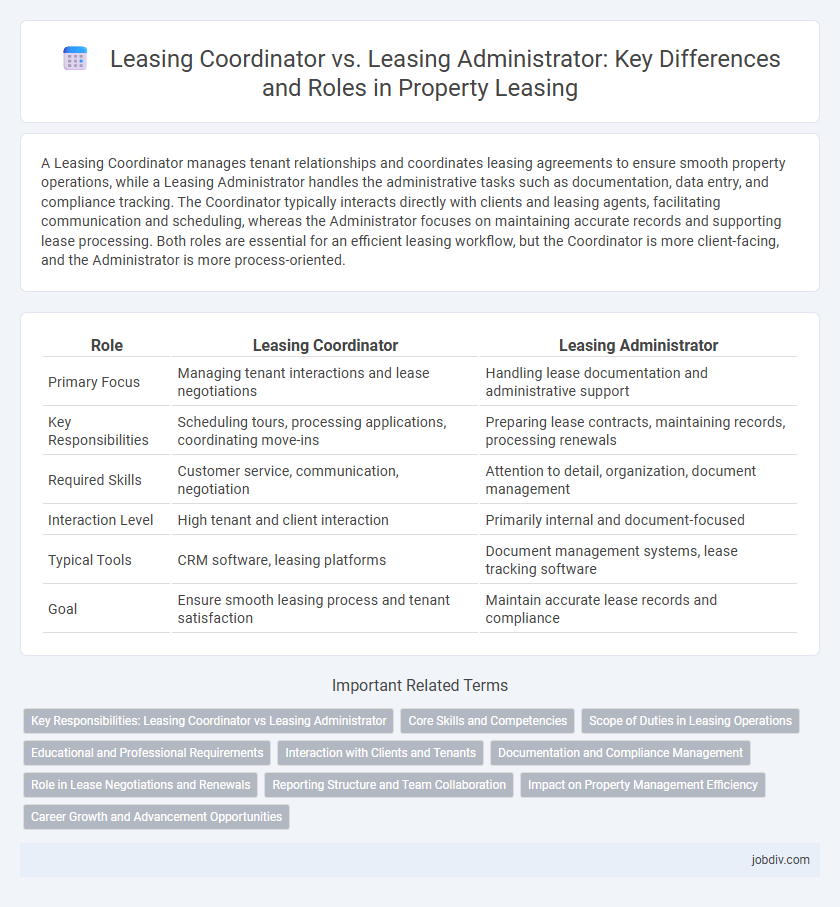A Leasing Coordinator manages tenant relationships and coordinates leasing agreements to ensure smooth property operations, while a Leasing Administrator handles the administrative tasks such as documentation, data entry, and compliance tracking. The Coordinator typically interacts directly with clients and leasing agents, facilitating communication and scheduling, whereas the Administrator focuses on maintaining accurate records and supporting lease processing. Both roles are essential for an efficient leasing workflow, but the Coordinator is more client-facing, and the Administrator is more process-oriented.
Table of Comparison
| Role | Leasing Coordinator | Leasing Administrator |
|---|---|---|
| Primary Focus | Managing tenant interactions and lease negotiations | Handling lease documentation and administrative support |
| Key Responsibilities | Scheduling tours, processing applications, coordinating move-ins | Preparing lease contracts, maintaining records, processing renewals |
| Required Skills | Customer service, communication, negotiation | Attention to detail, organization, document management |
| Interaction Level | High tenant and client interaction | Primarily internal and document-focused |
| Typical Tools | CRM software, leasing platforms | Document management systems, lease tracking software |
| Goal | Ensure smooth leasing process and tenant satisfaction | Maintain accurate lease records and compliance |
Key Responsibilities: Leasing Coordinator vs Leasing Administrator
Leasing Coordinators primarily manage tenant communications, schedule property showings, and assist with lease documentation to ensure smooth leasing operations. Leasing Administrators focus on processing lease agreements, maintaining accurate leasing records, and coordinating administrative tasks such as rent collection and compliance monitoring. Both roles collaborate closely but differ in emphasis, with Coordinators driving tenant engagement and Administrators ensuring operational accuracy.
Core Skills and Competencies
Leasing Coordinators excel in tenant communication, lease documentation, and property showings, emphasizing strong interpersonal skills and organizational abilities. Leasing Administrators focus on lease processing, data entry accuracy, and compliance with legal regulations, requiring attention to detail and proficiency in property management software. Both roles demand expertise in contract management, customer service, and multitasking to support seamless leasing operations.
Scope of Duties in Leasing Operations
A Leasing Coordinator manages tenant relations, schedules property showings, and facilitates lease agreement processes to ensure smooth occupancy transitions. A Leasing Administrator focuses on maintaining leasing documentation, processing rental payments, and handling administrative tasks related to lease compliance and record-keeping. Both roles are essential in leasing operations, with the Coordinator emphasizing tenant engagement and the Administrator concentrating on operational accuracy and regulatory adherence.
Educational and Professional Requirements
A Leasing Coordinator typically requires a high school diploma or associate degree, with experience in customer service and property management to handle tenant communications and lease documentation efficiently. Leasing Administrators often hold a bachelor's degree in business administration, real estate, or related fields, coupled with advanced knowledge of leasing regulations, contract management, and financial reporting. Professional certifications such as Certified Property Manager (CPM) or Accredited Residential Manager (ARM) enhance the qualifications for both roles, emphasizing expertise in property leasing and administration.
Interaction with Clients and Tenants
Leasing Coordinators engage directly with clients and tenants to schedule property tours, handle inquiries, and facilitate lease agreements, ensuring a personalized experience throughout the leasing process. Leasing Administrators primarily manage lease documentation, payments, and renewals, interacting with tenants to resolve administrative issues and maintain accurate records. Both roles require strong communication skills, but Leasing Coordinators emphasize relationship building, while Leasing Administrators focus on operational support.
Documentation and Compliance Management
Leasing Coordinators manage lease documentation by ensuring all contracts and amendments are accurately prepared, reviewed, and stored according to company policies. Leasing Administrators focus on compliance management by monitoring regulatory changes, maintaining up-to-date records, and coordinating with legal teams to ensure adherence to leasing laws. Both roles require meticulous attention to detail and strong organizational skills to maintain seamless leasing operations.
Role in Lease Negotiations and Renewals
A Leasing Coordinator primarily facilitates communication between tenants and landlords during lease negotiations, ensuring all terms align with company policies and tenant needs. A Leasing Administrator manages the documentation and administrative tasks related to lease renewals, tracking key dates and ensuring compliance with legal and financial requirements. Both roles contribute to smooth lease processes but differ in their focus on negotiation facilitation versus administrative execution.
Reporting Structure and Team Collaboration
A Leasing Coordinator typically reports to the Leasing Manager and acts as a liaison between tenants and management, ensuring smooth communication and lease processing. Leasing Administrators usually work under the Leasing Coordinator or directly within the Property Management team, focusing on documentation, compliance, and data accuracy for lease agreements. Both roles require close collaboration with sales, legal, and finance teams to streamline operations and maintain accurate reporting structures.
Impact on Property Management Efficiency
Leasing Coordinators streamline property management by handling tenant inquiries, coordinating showings, and facilitating lease agreements, which accelerates tenant acquisition and retention processes. Leasing Administrators focus on managing lease documentation, processing renewals, and ensuring compliance with lease terms, reducing administrative errors and legal risks. The combined roles enhance overall property management efficiency by balancing tenant engagement with meticulous lease administration.
Career Growth and Advancement Opportunities
Leasing Coordinators often manage client interactions and lease documentation, providing valuable frontline experience that can lead to roles such as Leasing Manager or Property Manager. Leasing Administrators focus more on processing lease agreements, maintaining records, and ensuring compliance, which develops skills suited for positions in lease compliance or real estate administration. Career growth for Leasing Coordinators tends to emphasize leadership and tenant relations, while Leasing Administrators may advance through specialization in lease processing and regulatory roles.
Leasing Coordinator vs Leasing Administrator Infographic

 jobdiv.com
jobdiv.com